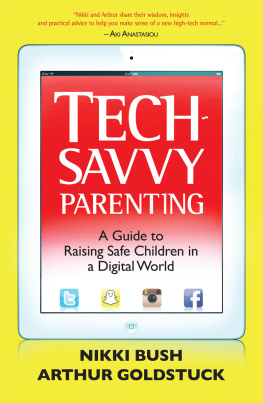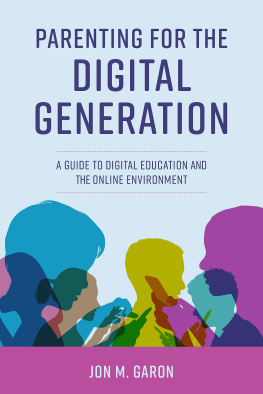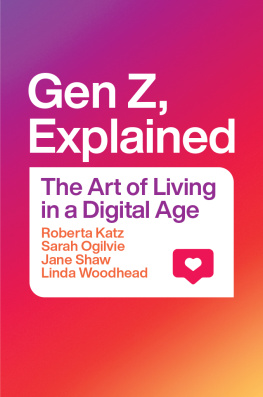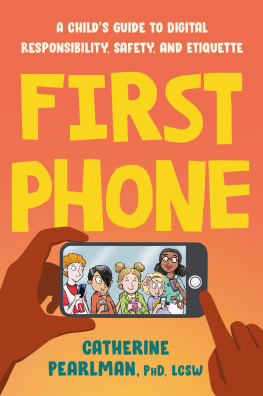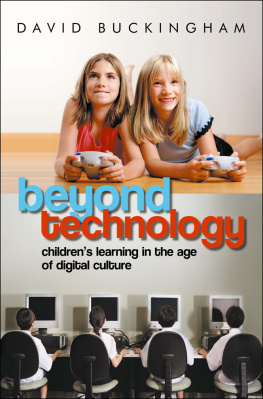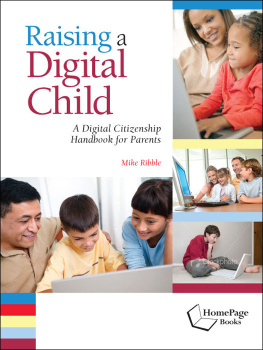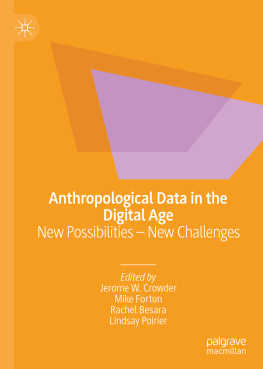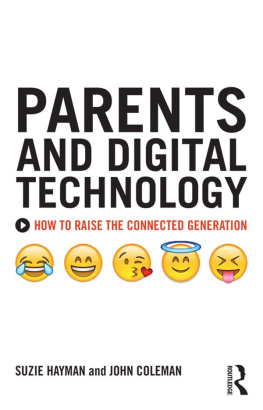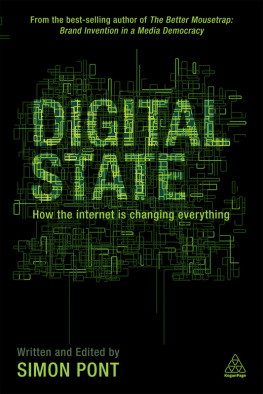PRAISE FOR BORN DIGITAL
Philosophy blends with social issues and insights in an invaluable pick for a brave new world, perfect for any discussions or collections strong in social issues, philosophy or science.
California Book Watch
After a slew of interviews with what they call Digital Natives and a thorough survey of the digital world, Palfrey and Gasser have written a book about this social transformation that is both insightful and responsible.
Washington Monthly
Born Digital offers a compelling account for parents, teachers, policy-makers, lawyers, and technical developers who want to know more about digital natives online activities and how these are changing society. Palfrey and Gasser present a balanced view, highlighting problems and calling for solutions. Born Digital is timely and informative.
Science
Palfrey and Gassers fine early history of this generation serves as a starting point for any conversation about how to mentor the children of the Web.
City Journal
Parents and educators will benefit from Palfrey and Gassers discussion of issues like safety, content control and illegal file sharing.
Publishers Weekly
Ultimately, the book is an accessible survey of many of these as-yet-unsolved Internet dilemmas of our time and is well executed given the immense task of synthesizing the vast corpus of social science concerns relating to the Internet.
Library Journal
Energetic, expert, and forward-looking, the authors serve as envoys between the generations. As old institutions crumble, there is a need for just this sort of enlightening, commonsensical, and positive guide to digital reality.
Booklist
Digital technologies are changing our kids in ways we dont yet understand. This beautifully written book will set the framework for a field that will change that. It is required reading for parents, educators, and anyone who cares about the future.
Lawrence Lessig, author of Code and Free Culture
From now on, any attempt to understand what it is like to grow up or to live ones life in a digital world must begin with this outstanding, original synthesis.
Howard Gardner, author of Five Minds for the Future and Multiple Intelligences


Copyright 2008, 2016 by John Palfrey and Urs Gasser
Published by Basic Books, an imprint of Perseus Books, a division of PBG Publishing, LLC, a subsidiary of Hachette Book Group, Inc.
All rights reserved. Printed in the United States of America. No part of this book may be reproduced in any manner whatsoever without written permission except in the case of brief quotations embodied in critical articles and reviews. For information, address Basic Books, 387 Park Avenue South, New York, NY 10016-8810.
Books published by Basic Books are available at special discounts for bulk purchases in the United States by corporations, institutions, and other organizations. For more information, please contact the Special Markets Department at the Perseus Books Group, 2300 Chestnut Street, Suite 200, Philadelphia, PA 19103, or call (800) 810-4145, ext. 5000, or e-mail special.markets@perseusbooks.com.
Designed by Timm Bryson
Library of Congress Cataloging-in-Publication Data
Palfrey, John.
Born digital: how children grow up in a digital age / John Palfrey and Urs Gasser.
p. cm.
Includes bibliographical references and index.
1. Information societySocial aspects. 2. Information technologySocial aspects. 3. Technological innovationsSocial aspects. 4. Internet and children. 5. Internet and teenagers. 6. InternetSocial aspects. 7. TechnologySocial aspects. 8. Digital mediaSocial aspects. I. Gasser, Urs. II. Title.
HM851.P34 2008
302.2310835dc22
2008021538
ISBN 978-0-465-09415-8 (2016 e-book)
10 9 8 7 6 5 4 3 2 1
FOR OUR CHILDREN
Ananda AND Dave
Jack AND Emeline
CONTENTS
R AISING AND EDUCATING CHILDREN WAS HARD ENOUGH AS IT WAS. The way young people today use technology has only made things more complicated. Its one thing to worry about how children are socializing, learning, and growing up generally without texting, sexting, and an always-accessible mobile phone at hand. Yet for most young people in most countries today, thats their reality. As their parents and their teachers, we must catch up to them and figure out how to lead the way.
Our children are spending an extraordinary amount of their time staring into screens. In 2015, the average US teenager spent about nine hours per day using various digital devices, according to a study by Common Sense Media. An average tweenthat is, a child between the ages of eight and twelvespent
Think about how much more complex the jobs of parenting and teaching have become with social media and other digital technologies in the mix. In the analog eralets call that before the 1980sthe task of raising a child involved social and emotional challenges at every age. Parents worried about their young children making friends and learning how to share in kindergarten. They sought to give their children strength not to submit to peer pressure as they entered middle school. They called upon the better angels of their childrens nature as they ran the gauntlet of the teenage years, with its manifold temptations and challenges. Parents did everything they could to help their children become well-adjusted, confident, happy people as they launched into the world as adults.
In the digital age, these questions remain at the core of what we worry about as parents. The essential nature of the challenge doesnt change. Whats different in the digital age is that theres another layer of complexity to the problem. Our childrens lives are mediated by technology much, though not all, of the time. Our children are living partly in a digital environment and partly in a face-to-face environment. From their perspective, there is no online life and offline life. Theres just life. The two are nearly seamless. The consequences of their actions in the digital realm are just as real to them as they are in the face-to-face environment, and sometimes even more acutely felt.
Our job as parents and as teachers is to help children make good choices in their digital life, just as they must in the analog aspects of their lives. An eight-year-old has always needed to learn not to wander alone into a dangerous part of town or to accept rides from strangers lurking around a park. She still needs that lesson, but she also needs to learn to make good choices with respect to data she shares about herself online and how she presents herself to the public on her first social media sites. And she needs to know what the consequences can be of making a mistake in these regards.
As the adults who are guiding them, we need to use these technologies wisely ourselves in order to be good examples to our children and our students. In order to be credible to a young person, we need to be fluent in how these technologies work, how other people are using them, and what effects their use can have. We dont have to become experts in every new app as it emerges on the scene, but we do need to get our hands dirty (or, more literally, thumbs active) enough to understand how to give decent advice. Most of the time, common sense should be a sufficient guide to children, but we all know that children can sniff us out quickly if we sound like we dont know what we are talking about.
Next page

